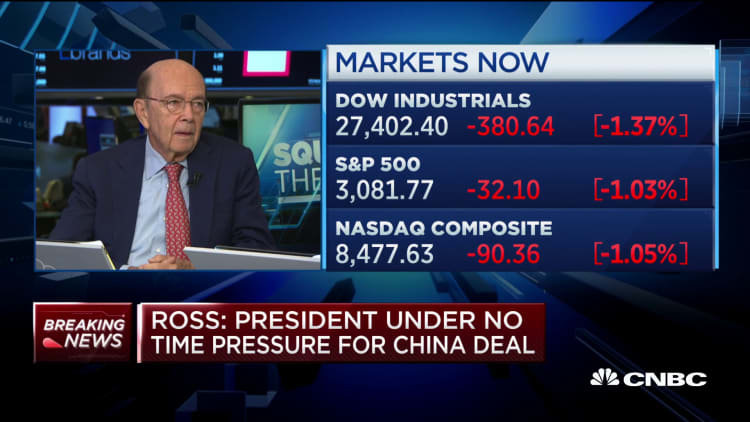
Waiting until after the 2020 election to strike a China trade deal takes away some of Beijing's ability to put pressure on the U.S., Commerce Secretary Wilbur Ross told CNBC on Tuesday.
"That takes off the table something that they may think gives them some leverage. Because once the election occurs — and the president seems to be in very good shape for the election — once it occurs and he's back in, now that's no longer a distraction that can detract from our negotiating position," Ross said in an interview on "Squawk on the Street."
Ross' comments reinforce earlier remarks from President Donald Trump that contributed to major U.S. stock indexes tumbling more than 1%. The president said in London early Tuesday that, "in some ways, I like the idea of waiting until after the election for the China deal."
Though Trump announced a partial "phase one" agreement with China in October, Washington and Beijing have failed to sign the preliminary deal to ease the trade war between the world's two largest economies. As part of the conflict, Washington and Beijing have slapped tariffs on hundreds of billions of dollars in imports. The U.S. is set to impose new tariffs on China on Dec. 15.

Ross told CNBC he expects staff-level trade talks between the U.S. and China to continue but added that no high-level discussions between the world's two largest economies are scheduled before the Dec. 15 deadline.
As Trump faces a potentially tight reelection bid in November 2020, Beijing has targeted agricultural products and other goods made in parts of the country key to Trump's political support. His administration has already rolled out $28 billion in subsidies to farmers battered in part by the trade war.
Trump, who campaigned on cracking down on what he called Chinese trade abuses, sees progress toward a deal as a political priority ahead of the 2020 election. Even so, both Trump and Ross argued Tuesday that the president faces no specific timeline to strike a deal.
At the NATO summit in London, Trump said he has "no deadline" to reach a deal with China. The Commerce secretary also told CNBC on Tuesday that it is "important that the president make clear he's under no time pressure to get [an agreement] done."
"The president's objective always has been to get the right deal independently of when or anything else like that," Ross said. "So his objectives haven't changed. And if we don't have a deal, he's perfectly happy to continue with the tariffs as we have."
The U.S. has slapped tariffs on more than $500 billion in goods from China. Beijing has imposed duties on about $110 billion in products from the U.S.


